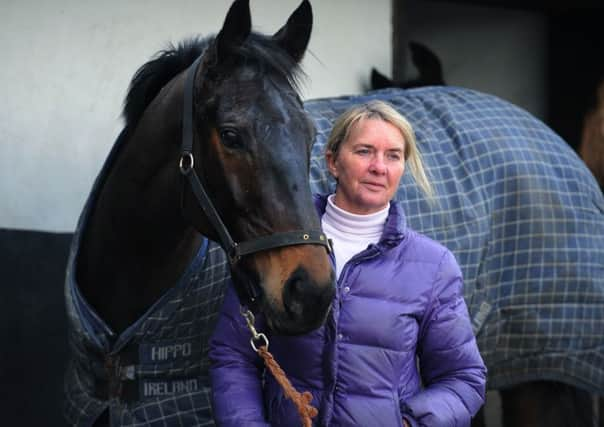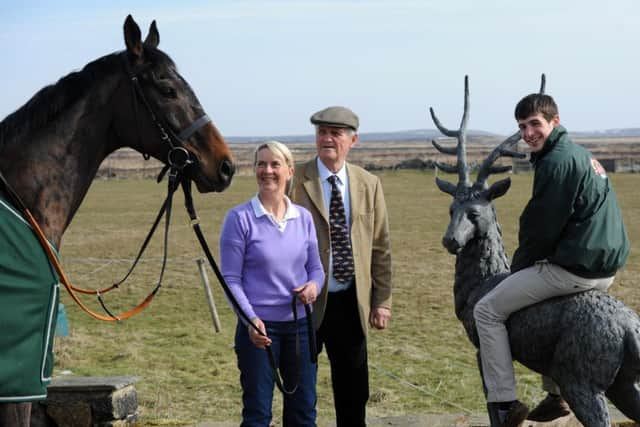Weekend Interview: Sue and Harvey Smith reveal secrets behind their 1,000 winners


“I couldn’t get up in the morning with nothing to do,” she tells The Yorkshire Post. “It’s our life – and Harvey’s just as horse mad as I am. I just love horses. I don’t know anything but horses. To see happy, healthy horses going to the races and winning races... it’s what we do.”
Very successfully, too, in the 25 years since African Safari won at Ascot on November 16, 1990, to provide Smith with her first winner. “We thought we had cracked it,” she laughed.
Advertisement
Hide AdAdvertisement
Hide AdThey have now. Smith and her husband Harvey, the international show-jumper from Bingley who needs no introduction, have become one of the most successful – and respected – partnerships when it comes to training staying steeplechasers.


Only the Smiths could have trained Auroras Encore, a £9,000 bargain buy from Doncaster Sales, to win the 2013 Grand National when blizzards had left their gallops frozen.
Or Mister McGoldrick, the rags-to-riches horse named in honour of a Leeds heart surgeon who provided the couple with long-overdue first Cheltenham Festival success in 2008 with a piece of inspired front-running by Guiseley-born Dominic Elsworth that the trainer describes as “the perfect ride”.
Or the who’s who of horses, past and present, who have lit up winter afternoons in the mud. Kildimo, The Last Fling, Ardent Scout, Artic Jack, Patriarch Express, Errand Boy, Royal Emperor – the latter twice denied by agonisingly short margins at the National Hunt Festival – and then the current warriors headed by Wakanda, who runs at Cheltenham today, and last week’s Haydock hero Cloudy Too. The list is endless.
Advertisement
Hide AdAdvertisement
Hide AdYet the landmark of 1,000 winners, brought up when stable stalwart Lackamon came from last to first to win the North Yorkshire National at Catterick under a never-say-die ride from Danny Cook, was a remote one when African Safari galloped clear at Ascot under Robert Stronge.


Smith, a top-class show-jumper in her own right, grew up in Sussex and a visit to see her father Henry Maslen’s racehorses – they were not running to the best of form – triggered a chain of events which saw the couple effectively switch sports. “He was a proper horsey man, my dad,” she says. “Harvey said that we’d take the horses.”
They moved the horses to High Eldwick, hacked them on Baildon Moor, galloped them at Middleham with the support of George Moore (who retired as a trainer yesterday) before one persuasive phone call from a perspective owner sealed the deal.
“It was David Stephenson,” said Smith. “He rang up to ask if I was thinking of taking out a training licence. ‘Of course she is’, said Harvey before I could reply.”
Advertisement
Hide AdAdvertisement
Hide AdApart from spending their respective lives with horses, the new trainers had another big advantage – the farm and rolling land that Smith had purchased when show-jumping was box office. It proved ideal terrain for a stamina-enhancing gallop and the healing powers of his mythical ‘Doctor Green’ – both attribute the recuperative powers of the moor, and its fertile grazing land, to the longevity of their horses.
Yet Smith is doubtful that she would be able to start a training career today because an elite number of mega-trainers and owners dominate.
“Not in this job,” she says. “You’ve got to have a big backer behind you. You can’t start off with nothing. You need the facilities to do the job. And the dreadful thing that is called money. We were very fortunate because Harvey had the farm and the land here.
“Lots of people ask ‘how do you get your horses so fit?’ It’s the way we’ve got round to training them. We train them long and strong...stamina is our forte up this hill and gallop. That really plays into our hands. With Harvey’s experience, he was always proud about how fit his show-jumpers were.”
Advertisement
Hide AdAdvertisement
Hide AdEven now, and approaching her 68th birthday, Smith admits that she can not keep away from the stables and works closely with her assistant, Ryan Clavin. Her indefatigable husband, whom she describes as “a good mess-maker”, is still very hands-on – whether it be maintaining the gallops, driving the horse box to the races, instructing riders or purchasing new horses.
“A thousand winners to go with four, five-thousand show-jumping winners between us,” he says. “It’s been a long hard road, but we’re there. It’s all been done with horses from the bottom end of scale at the sales, not expensive fellas. They’ve all been made. My first show-jumper, Farmer’s Boy, cost 33 guineas. One of the last racehorses I bought (Perseid) cost £500 and he has won two (races) already. That gives you a good idea. From 1947 to 2016, we’ve always been competitive.
“You have your bad days, but your good days always overcome your bad days. With horses, there are no horizons. You just keep going.”
He turns to his wife: “Is that right, Missus?”
“Something like that,” she says.
“There will be nobody else in the country who’ve done what we’ve done. To go from one sport to another and finish up top end of both,” replies Smith, 77.
Advertisement
Hide AdAdvertisement
Hide AdYet both remain concerned for jump racing’s future in the North.
They say prize money needs improving to attract new owners whose support, in turn, can help increase the wages of stable staff.
There’s also the vexed issue of handicapping – the aforementioned Cloudy Too has been penalised 12lb for his Peter Marsh Chase triumph last weekend and Harvey Smith says this is too harsh for horses “who the public love to see”.
He remains particularly proud that they trained Baltic Brown, a horse that often came from last to first as others faltered, to win six races in 1994-95. “The crowds loved him,” he says.
Advertisement
Hide AdAdvertisement
Hide AdLike the late Sir Peter O’Sullevan, he wishes commentators would acknowledge owners when their horses win. Then there is the sport’s governance. “They have turned an every man’s sport into an elitist sport and this is caused by the BHA employing clever people with no experience in horses or horse management.”
Nevertheless, Sue and Harvey Smith remain as enthusiastic as ever. There are still races to be won – and they hope Wakanda will, in time, develop into a Cheltenham Gold Cup contender. “To train 1,000 winners, it is very satisfying. It is a milestone. It’s taken 25 years. We don’t have big numbers in training like others, we keep it to 40 or 50,” adds the trainer.
“Winning the Grand National was a highlight, and it would be nice to win a Gold Cup. Then you can say you’ve done three substantial things. But you can’t keep bringing long-distance horses out week after week. You’ve got to be patient. We’ll keep plodding on.”
The Sue Smith story...
BORN in West Sussex on February 23, 1948, Sue Smith was a top class show-jumper who also had the distinction of riding in Britain’s first ladies’ race.
Advertisement
Hide AdAdvertisement
Hide AdHer first victory came courtesy of African Safari at Ascot in November, 1990, and Mister McGoldrick became her first Cheltenham Festival winner in 2008.
When Auroras Encore won the John Smith’s Grand National in 2013 as a 66-1 outsider, she became just the third woman – after Jenny Pitman (twice) and Venetia Williams – to win the world’s greatest steeplechase.
Though stable star Wakanda’s big race win at Ascot last month was heralded as her 1,000th success, the landmark win under National Hunt rules came on January 14, 2016, when Lackamon landed the North Yorkshire National at Catterick.